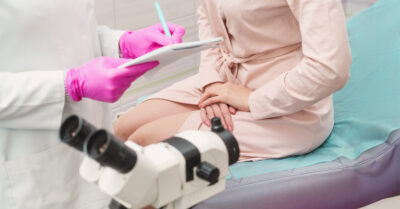Colposcopy
 Regular cervical cancer screening is key to protecting your health. A Pap test checks for abnormal cells on your cervix, while an HPV test looks for human papillomavirus, a virus linked to cervical cancer. If your screening results show abnormalities, your doctor may recommend a colposcopy.
Regular cervical cancer screening is key to protecting your health. A Pap test checks for abnormal cells on your cervix, while an HPV test looks for human papillomavirus, a virus linked to cervical cancer. If your screening results show abnormalities, your doctor may recommend a colposcopy.
What is a Colposcopy?
Colposcopy is a safe and simple procedure. It helps your gynecologist examine your cervix, vulva, and vaginal wall. They use a special tool called a colposcope for this.
Your doctor might take a small tissue sample, called a biopsy, from your cervix or vagina during the procedure. This sample helps determine if abnormal cells are present and what the next steps may be. Not everyone who has a colposcopy needs treatment. But this test gives important information for your care.
Why Do I Need a Colposcopy?
A colposcopy may be recommended if your cervical screening results were abnormal. It may also be done if your gynecologist noticed unusual areas on your cervix, vagina, or vulva. Abnormal results often happen due to infections like HPV, which can lead to cervical precancer or cancer if not treated.
A colposcopy can also help identify other conditions, such as genital warts or polyps, which are noncancerous growths.
How Do I Prepare For a Colposcopy?
Colposcopy can be performed at any point during your menstrual cycle. However, heavy bleeding might make it difficult to view the cervix. If you have significant bleeding on your appointment day, call ahead to confirm if you should reschedule.
Additionally, you will want to let your doctor know if you:
- Take blood-thinning medications since these can increase bleeding risk during biopsy. Examples include aspirin, warfarin, heparin, and clopidogrel.
- Are pregnant or think you might be pregnant? Colposcopy itself is safe during pregnancy. However, biopsies are usually avoided unless absolutely necessary.
What Happens During a Colposcopy?
Colposcopy typically takes just 5 to 10 minutes and is done in the office. The procedure resembles a regular pelvic exam.
- You will lie comfortably on an exam table.
- Your gynecologist will insert a speculum to gently open the vagina and see your cervix clearly.
- A mild vinegar solution, acetic acid, will be applied to the cervix. This solution highlights abnormal areas, making it easier for your doctor to see any cells that need closer attention or biopsy. You might feel a slight cold or mild stinging sensation, but it usually doesn’t hurt.
- Using the colposcope, which stays outside your body, your gynecologist closely examines your cervix.
What Happens If I Need a Biopsy?
If abnormal areas are visible, your doctor may take a small tissue sample called a biopsy. This step might cause mild discomfort or brief cramping but usually doesn’t require numbing medication. You might feel slight pressure or a brief pinch as your doctor removes the abnormal tissue sample.
After the biopsy, your doctor may apply a special solution as a protective coating on the biopsy site. This acts as a liquid bandage and helps minimize bleeding.
What Happens After a Colposcopy?
Immediately after the procedure, you might feel slightly dizzy or queasy. Lying down and applying a cool cloth to your forehead usually helps. If you have a history of faintness during procedures, inform your doctor beforehand and take a few extra minutes to rest before getting up.
If you had a biopsy, you may notice:
- Mild vaginal bleeding or spotting for a few days
- Brown or black discharge from the solution used during the procedure
- Mild cramping or discomfort lasting a couple of hours
You can usually return to work or regular activities right after your colposcopy. For 48 hours after a biopsy, avoid tampons, sex, and anything else inside your vagina. This includes creams and douches. This helps with proper healing.
Recovery is usually quick after a colposcopy. However, reach out to your gynecologist promptly if you experience any of the following:
- Heavy vaginal bleeding
- Bleeding lasting longer than seven days
- Severe pelvic pain or cramps not relieved by ibuprofen
- Fever higher than 100.4°F
Mild, coffee-ground-like discharge is normal initially. But you should contact your doctor if you experience increasing vaginal discharge or if it has an unpleasant odor.
Getting Your Biopsy Results
Biopsy results are usually available within one to two weeks. Your doctor will tell you when and how you’ll receive your results. Your gynecologist might recommend more monitoring, repeat screenings, or additional treatment based on the biopsy results.
Colposcopy FAQs
1. Can a colposcopy affect my fertility?
No. Having a colposcopy, even with a cervical biopsy, typically doesn’t affect your fertility or ability to become pregnant. The biopsy samples are tiny, and your cervix heals quickly afterward.
2 . Can I have a colposcopy if I’m menstruating lightly?
Yes, you can usually have a colposcopy during light menstrual bleeding. Heavy bleeding might obscure your doctor’s view of the cervix, but spotting or mild bleeding typically does not interfere. If you’re unsure whether your bleeding is too heavy, call your gynecologist ahead of your appointment.
3. Can I drive myself home after a colposcopy?
Yes. The procedure is minimally invasive, and any discomfort typically resolves quickly. However, if you tend to feel dizzy, anxious, or faint during medical procedures, you might feel more comfortable arranging for someone to drive you home.
4. Can I shower normally after a colposcopy and biopsy?
Yes, showering is safe at any time after the procedure. However, avoid soaking in baths, hot tubs, or swimming pools for at least 48 hours following a biopsy to allow proper healing.
Quick Facts
OB/GYN Doctors
Testimonials
“Great service. Dr. Shelton was my OB and delivered my son. He was always willing to answer questions and very knowledgeable. He was kind and courteous during delivery because let’s be honest… that’s not the most flattering moment in a woman’s life.” – BW
“Dr. Cohen is an amazing Dr. Along with her staff and the reception team it’s always a pleasant experience. I know I can call and leave messages for the team if I have questions or concerns. Dr. Cohen was with me through my whole pregnancy, rooting me on during delivery. Best team there could be.” – NP
“I absolutely love Dr. Kelly. I’m on my third pregnancy now and she has been my OB for all three. She’s always understanding and considerate when I need someone to talk too and she always makes sure I don’t have any additional questions before our appointment is over. She will ALWAYS be my recommended OB at the Women’s Health Center.” – KM






